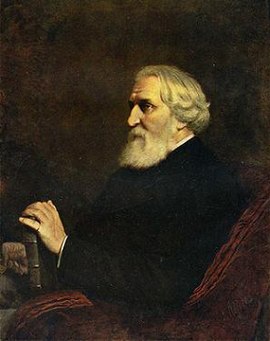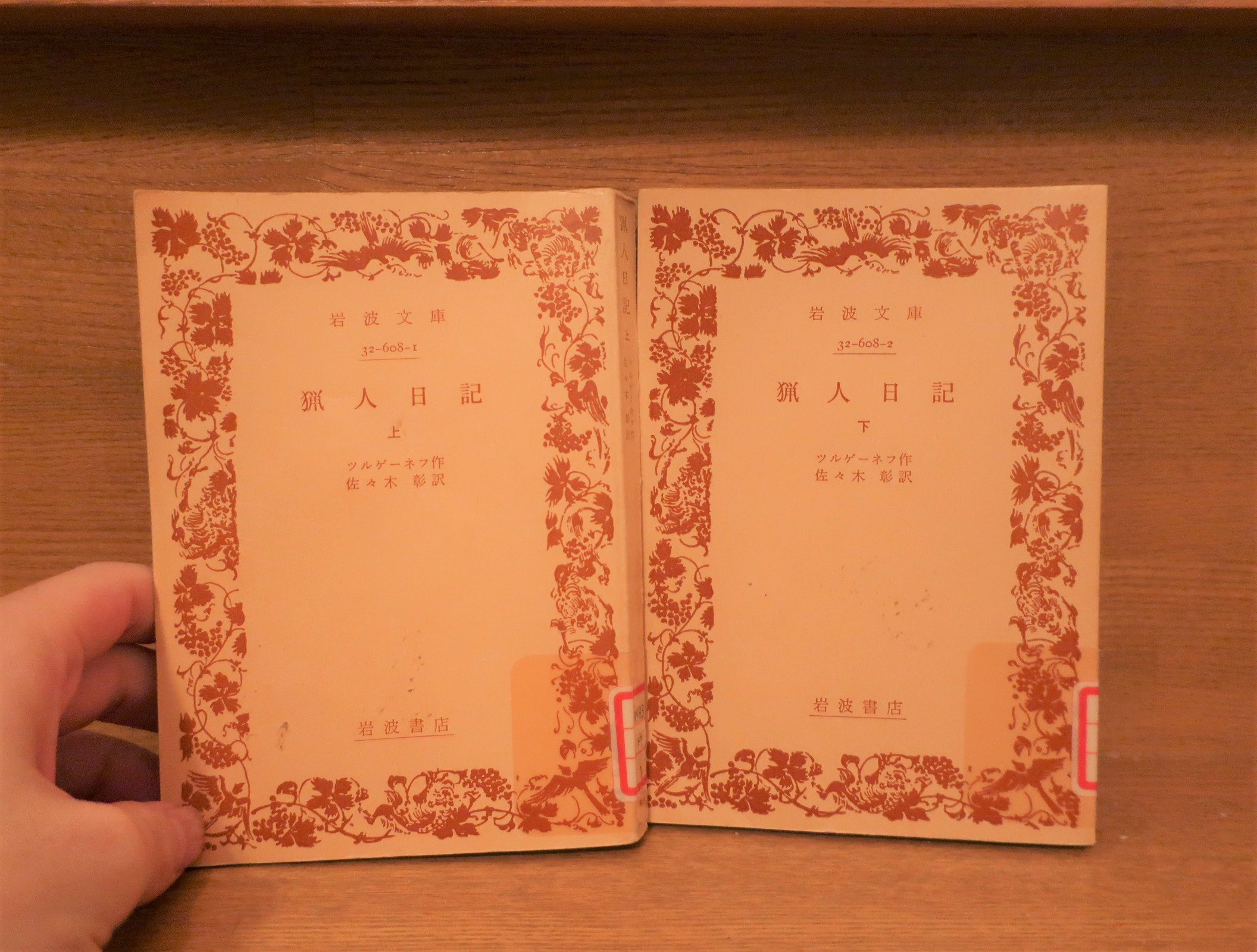Synopsis and description of Turgenev's masterpiece "The Hunter's Diary

Turgenev (1818-1883)Wikipedia.
The Diary of a Hunter is a collection of short stories published by Turgenev in 1852.
I read "Diary of a Hunter" translated by Akira Sasaki, Iwanami Shoten.
The Diary of a Hunter, the work that made Turgenev famous, was published in the form of a collection of many short stories.
We will look at the commentary at the end of the book.
It was more than a hundred years ago, in 1847, that "Hori and Kalinuichi," the first of the "Diary of a Hunter," appeared in the magazine "Dōdaijin" with the subtitle "From the Diary of a Hunter.
It did not appear in the creative writing section, but in the miscellaneous news section to fill a gap, so to speak. According to Turgenev, the person who came up with this subtitle was Panaev, a writer and editor of "Contemporaries" at the time. He is the author of "Literary Recollections" (already published in Iwanami Bunko). However, encouraged by the success of "Khori and Kalinuich," the author wrote a series of rural sketches of hunters.
Within the same year 1847, "Pyotr Petrovich Kalataev," "Ermolai and the Miller's Wife," "Neighbor Razirov," "The Townsman Ovshannikov," "Ligov," "The Manor Keeper," and "The Office" were published in the magazine "The Contemporaries.
Encouraged by the success of The Hunters, Turgenev published a series of subsequent works in Contemporaries.
Iwanami Shoten, Turgenev, The Hunter's Diary, translated by Akira Sasaki, p. 303
Some line breaks have been made.
Translated by Futabatei ShimeiAibiki."is also one of the works included in this "Diary of a Hunter. Also in the commentary,
Turgenev was one of the earliest Russian writers to become known in Japan. In particular, "Aibiki" was introduced to Japan early through Futabatei Shimei's famous translation (1881), and its wonderful depiction of nature had a great impact on the younger generation at that time. Not a few works, including Kunikida Doppo's "Musashino" (1908), were influenced by it.
Iwanami Shoten, Turgenev, The Hunter's Diary, translated by Akira Sasaki, p. 305
It is stated.
Seiro Sato'sThe Life of Turgenev."describes this work as follows
In The Hunter's Diary, there is everything Turgenev has to offer, without any price tag. If Dostoevsky's entire oeuvre can be summed up under the title "Crime and Punishment," and if Froebel's entire oeuvre can be described as an "emotional education," then Turgenev's entire oeuvre is "The Hunter's Diary.
Chikuma Shobo, Seiro Sato, "Life of Turgenev," p. 41
Seiro Sato states that this work is very important for understanding Turgenev.
And this "Diary of a Hunter" is the result of Turgenev's own experiences. He loved hunting and often went hunting. Each of the short stories is a record of his experiences.
Just because hunting is not a profession, this hunter is not attached to real life. They are not mired in the mud of life. They are the enjoyers of a privileged life.
This hunter chases wild birds with a rifle on his shoulder and looks at the people he sometimes encounters with fresh wonder. He looks at people's lives not from the inside, but from the outside, with eyes wide-open.
The eye discovers "new things" everywhere. Surprises do not occur in familiar places. He is sharp and alert, listening for the slightest rustle of the wind or the muffled chirp of a bird.
His eyes, looking at the wrinkled faces of passing peasants, millwrights, and woodsmen, are as fresh as if he were seeing people in the world for the first time. Not only does he look at people, but even the eyes of a dog see things that ordinary people do not see.
For example, the traveler is surprised that Ermolai's dog (Waletka) does not smile even once, and he senses in its behavior a "puzzling indifference to everything in the world" and "disillusionment. Just as a person who opens his eyes and sees things for the first time has no preconceived notions, the hunter sees everything reflected in his eyes and heart as it is.
Literary historians point out that before him there was the naturalistic writing style known as "Petersburg physiology" and the rural fiction of Daly and Grigorovich. But did any of them see the people with fresh, non-preconceived eyes as he did?
As all great art contains some kind of "discovery," "The Hunter's Diary" also contains a number of new discoveries. This one discovery alone is enough to immortalize Ivan Turgenev's name in the history of literature.
Chikuma Shobo, Seiro Sato, Life of Turgenev, p. 41-42
Kimito Ogura's "Turgenev: Life and Works" also described the characteristics of "The Hunter's Diary" and its excellence as follows.
In The Hunter's Diary, Turgenev demonstrated his mastery of the Russian landscape. No one prose writer has ever described nature as exquisitely as he did.
Most of his landscapes depict scenes of great natural beauty in the nature of Russia, especially in the steppes and forests of the Oryol and Kaluga provinces and the areas in between, where plains and arable lands are separated by gorges and winding streams, forests of birches and lime trees with their incomparable fragrance, and deep forests inhabited by all kinds of birds. The deep forests, with all kinds of birds, made the observant Turgenev's heart dance.
In addition to all these near-perfect depictions, the poetic beauty and acceptance of Turgenev's depictions of nature is due to his special lyricism. What at first glance appears to be gray and drab acquires lyrical color and vivid pictoriality under Turgenev's brush.
Even the most ordinary old linden tree leaves indelible shadows when touched by his delicate brush, and a field of ordinary vegetables becomes a fertile, lush scene.
Hosei University Press, Kimito Ogura, Turgenev: Life and Works, p. 38-39
Some line breaks have been made.
In The Hunter's Diary, Turgenev's artistry is on full display. His aesthetic sense for nature seems to be extraordinary.
Another major factor in the writing of this work was his childhood, when he witnessed the oppressed serfs.
His mother acted like a tyrant, abusing not only the serfs but also Turgenev. He could not forget the image of his ugly mother, a landowner at that time.
Turgenev, who had a gentle nature, sympathized with the serfs. He is pained by the tyranny of the landowners, who regard them as nothing more than slaves. Therefore, Turgenev shows them that each serf is a human being with a beautiful heart.
The Diary of a Hunter" is a work about the realities of serfs in Russia. However, Turgenev was hardly in Russia when he wrote it. He dared to write this work away from his homeland.
In 1868, in his own recollections, Turgenev described the main idea of "The Hunter's Diary" as follows.
'I could not breathe the same air and perch in the same place with the one I loathed. I suppose I lacked the patience and fortitude of character that should have been due to it.
It was absolutely necessary for me to stay away from my enemies in order to attack them as strongly as possible from such a distance.
This enemy had a certain shape in my eyes and a well-known name. This enemy - serfdom. Under this name I concentrated everything, determined to fight against it to the end, and vowed never to be reconciled to it. ...... This was my Hannibal vow."
Hosei University Press, Kimito Ogura, Turgenev: Life and Works, p. 41
Turgenev felt an intense aversion to serfdom, which he had witnessed up close from an early age.
It is said that the "Diary of a Hunter" shocked Russian society so much that Tsar Alexander II decided to issue a decree for the emancipation of serfs after reading it.
That is how great the impact of this work was.
This work is significant not only as a representative work of Turgenev's art, but also for its ability to capture the reality of Russian society.
The above is a synopsis and commentary of Turgenev's masterpiece "The Hunter's Diary" - the masterpiece that made Turgenev's name famous in the literary world.
Next Article.
Click here to read the previous article.
Click here for a list of Turgenev's recommended works.
Related Articles





































